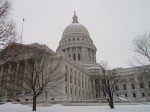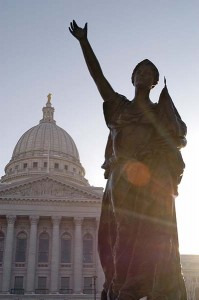
UW System President Ray Cross
University of Wisconsin System President Ray Cross addressed the Board of Regents Friday, broadly outlining reforms intended to improve efficiency and effectiveness while allowing the university to be more responsive to the needs of the state.
Some of the areas mentioned for reform:
- Faculty workload
- Class offerings and low-enrollment courses
- Search processes for chancellors
- Credit requirements
- Student segregated fees
- Administrative operations
PROFS President Grant Petty told the Wisconsin State Journal that courses are already examined carefully and cautioned against using credit hours taught as the only measure of efficiency:
“(L)ow-enrollment courses here at UW-Madison are often also high-impact courses. That is, they are usually taught to advanced students on a specialized topic by a professor with world-class expertise in that subject. Sometimes losing low-enrollment courses due to budget constraints means that our students lose valuable educational opportunities. Efficiency at UW-Madison cannot and should not be measured strictly in terms of the number of student credit-hours taught.”
Cross’ full remarks are here:





